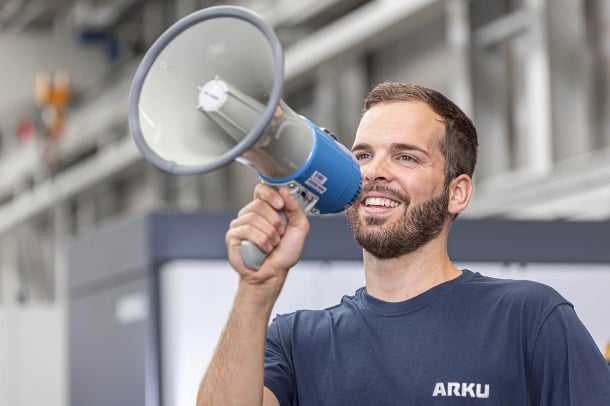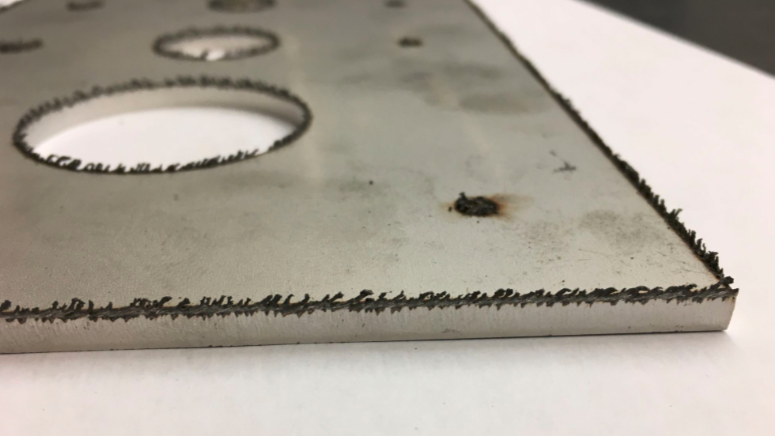
ARKU Newsletter
Exciting events, informative case studies, practical expert tips: With the ARKU Newsletter you are always well informed.

Airplanes, rockets or luxury cars: Aluminum is a popular material because of its low weight. However, processing the light metal has its pitfalls - this article tells you what to look out for.
With a density of 2.7 g/cm³, aluminum is used primarily in applications where low weight pays off. This is because comparable components made of steel quickly weigh three times as much as those made of aluminum. It is only thanks to the light metal that airplanes and rockets can fly and still transport many passengers and goods safely. In cars, the material helps to reduce CO2 emissions, because lighter vehicles consume less fuel. Aluminum is also in demand in other industries for various reasons.
Like most metallic materials, aluminum can be cut, ground or formed. However, depending on the process, more or less burrs are produced during cutting. Even when laser cutting aluminum, they are unavoidable. These burrs must be removed from aluminum parts and sheets, otherwise they can cause problems. These can be injuries to people or damage to products. In extreme cases, burrs on aluminum can mean a product recall. Burrs are removed via a deburring machine, which use brushes or abrasive belts to remove the burrs. At the same time, they can also round off the edges during the process, which can be very sharp after cutting.
However, aluminum has one serious disadvantage for processing: the metal is highly combustible. This applies all the more to the dust that is generated when deburring aluminum parts or sheet. Once the metal burns, temperatures of 2000 degrees Celsius and more are generated. That's why fire protection is extremely important when deburring aluminum.
Nowadays, deburred parts and sheets are a sign of quality and a must in order to remain competitive. We give you an overview of the most important deburring processes and techniques.
However, this fire and explosion hazard does not mean that you have to rely on a wet deburring machine to deburr aluminum. This is because these machines are expensive to operate and inconvenient to maintain. A good extraction system with a wet separator will allow for safe aluminum deburring even with a dry deburring machine. However, even the best extraction system cannot prevent dust pockets from occasionally forming within the deburring machine. This metal dust must be removed manually with an industrial vacuum cleaner.
Also, make sure that aluminum and other materials are deburred separately. This is important because steel can produce sparks, especially during grinding. If aluminum dust is in the vicinity, there is an acute risk of fire. Under no circumstances should you "quickly push another workpiece through the machine".
However, three basic rules will get you safely through the day-to-day operations of deburring:
Especially in mixed operations with steel, stainless steel and aluminum, quick-change systems for the deburring tools are beneficial. This saves employees setup time and keeps the deburring machine's productivity high.
Aluminum is often softer than steel, with large differences depending on the alloy. When deburring aluminum, the material is therefore more easily removed than with steel. Therefore, the deburring machine may need to be readjusted. Modern controls and software support operators in finding the right settings.
Whether thin sheet or heavy plate, small or large burrs - here you will find the perfect deburring machine for your metal processing needs. Are you looking for a solution that offers you optimum sheet metal quality, high process reliability and low unit costs? Learn more about our deburring machines!

Exciting events, informative case studies, practical expert tips: With the ARKU Newsletter you are always well informed.
ARKU Inc.
7251 E. Kemper Road
45249 Cincinnati, OH / USA
P: +1 513 985 0500
F: +1 513 985 0580
Maschines in use at customers, practical tips, events and much more: Find out what's new in the ARKU world.
ARKU Inc. © 2023 Mail info-us@arku.com Tel. +1 513 985 0500